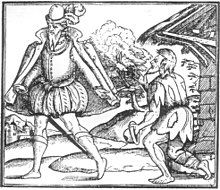Adoption of Elizabethan Poor Laws in North America
As British colonies, the early European settlers to North America adopted the Elizabethan Poor Laws. However, the adoption of these laws within the U.S. was stilted by several unique contextual factors.

The availability of natural resources and land made unemployment minimal in the colonies. Many early settlers believed that there would be no unemployment given the opportunities available within the colonies. This perspective coupled with the influx of Calvinist settlers in the north led early Americans to see vagrancy or poverty as a personal failing.

Calvinism viewed poverty as part of a divine hierarchy with those at the bottom of the economic latter morally predicated to suffer.

Unlike many European cities, there were no existing traditions or organizations providing assistance to people in need.